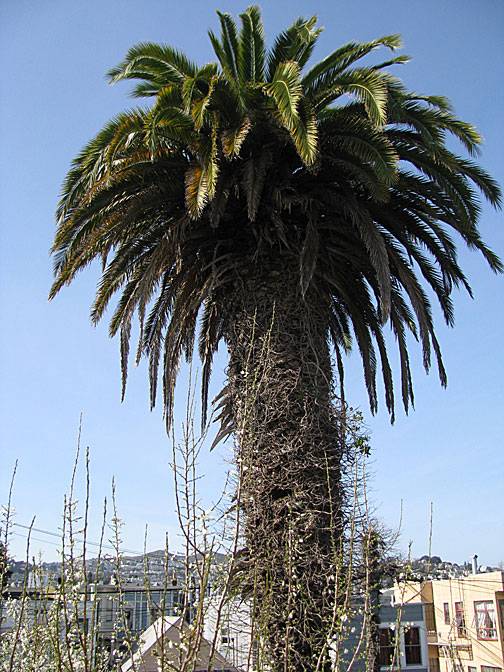Tropicalized Mission Palms: Difference between revisions
(PC and protected) |
No edit summary |
||
| (2 intermediate revisions by 2 users not shown) | |||
| Line 1: | Line 1: | ||
'''<font face = Papyrus> <font color = maroon> <font size = 4>Historical Essay</font></font> </font>''' | '''<font face = Papyrus> <font color = maroon> <font size = 4>Historical Essay</font></font> </font>''' | ||
''by Juan Felipe Herrera'' | ''by Juan Felipe Herrera, 1997, from "Riffs on Mission District Raza Writers" in '''Reclaiming San Francisco: History, Politics, Culture''' A City Lights Anthology (City Lights Books: 1998)'' | ||
[[Image:Palm-tree 0289.jpg]] | [[Image:Palm-tree 0289.jpg]] | ||
| Line 19: | Line 19: | ||
The palm tree is the radical image, the voice and language that heightens and colors the new vision, the new Latino aesthetic mission -- a ''tropicalization'' of our lives. A new poetics of political, cultural and literary "greenness" emerges with the new works of the Pocho-Che poets, underscored by Victor Hernandez-Cruz's own book, ''Tropicalization,'' published in the same year. | The palm tree is the radical image, the voice and language that heightens and colors the new vision, the new Latino aesthetic mission -- a ''tropicalization'' of our lives. A new poetics of political, cultural and literary "greenness" emerges with the new works of the Pocho-Che poets, underscored by Victor Hernandez-Cruz's own book, ''Tropicalization,'' published in the same year. | ||
The tropical metaphor refracts our world -- tropical peoples stripped of their homelands - purple corduroys, saris, Sonora ranch hats, black shawls, pedal-pushers, sawed | The tropical metaphor refracts our world -- tropical peoples stripped of their homelands - purple corduroys, saris, Sonora ranch hats, black shawls, pedal-pushers, sawed off levis pants, catholic pleated dresses, khaki trench coats, flowered muslin tank tops, laundry pressed polyester slacks, maroon turbans, Club jackets, Latino/as, Filipinos, Afro-Americans, Cubans, Asians and Indians. Hindi, Samoan, Tongan, Chicana and Salvadoreña talk, all in a be-bop stream of "green" sounds, neon and elastic, polished, bilingual and re-souled with adolescent first generation speech play, Nicaragüense, Salvadoreño, Guatemalteco, Hondureña, Peruana, Brasileira and Chicana rap. There is a palm tree outside our windows, the Pocho-Che poets seemed to say, we are that green barrio palm, we are that green earth flame star sparkle. | ||
[[The Tropics of Pocho-Ché|Prev. Document]] | [[The Tropics of Pocho-Ché|Prev. Document]] | ||
[[category:Mission]] [[category:Latino]] [[category:1970s]] [[category:Literary San Francisco]] | [[category:Mission]] [[category:Latino]] [[category:1970s]] [[category:Literary San Francisco]] [[category:Reclaiming San Francisco]] | ||
Latest revision as of 20:39, 21 November 2021
Historical Essay
by Juan Felipe Herrera, 1997, from "Riffs on Mission District Raza Writers" in Reclaiming San Francisco: History, Politics, Culture A City Lights Anthology (City Lights Books: 1998)
The Tropicalized Mission Palms
Photo: Chris Carlsson
The new tropical mission begins with the image of a palm tree as it sways over Alejandro Murguía's apartment. "Gato" Murguía, publishes "Palms outside my window" in Time to Greeze, the landmark anthology edited by the Mission poets of the Pocho-Che Collective in 1974.
Palms sway outside my windows, the sky is like that over the tropics on a
hot day. Walking into my room, a parrot greets me from a corner and a
mayna & guacamayo are outside, where an iguana hides in the grass.
The palm tree is the radical image, the voice and language that heightens and colors the new vision, the new Latino aesthetic mission -- a tropicalization of our lives. A new poetics of political, cultural and literary "greenness" emerges with the new works of the Pocho-Che poets, underscored by Victor Hernandez-Cruz's own book, Tropicalization, published in the same year.
The tropical metaphor refracts our world -- tropical peoples stripped of their homelands - purple corduroys, saris, Sonora ranch hats, black shawls, pedal-pushers, sawed off levis pants, catholic pleated dresses, khaki trench coats, flowered muslin tank tops, laundry pressed polyester slacks, maroon turbans, Club jackets, Latino/as, Filipinos, Afro-Americans, Cubans, Asians and Indians. Hindi, Samoan, Tongan, Chicana and Salvadoreña talk, all in a be-bop stream of "green" sounds, neon and elastic, polished, bilingual and re-souled with adolescent first generation speech play, Nicaragüense, Salvadoreño, Guatemalteco, Hondureña, Peruana, Brasileira and Chicana rap. There is a palm tree outside our windows, the Pocho-Che poets seemed to say, we are that green barrio palm, we are that green earth flame star sparkle.

